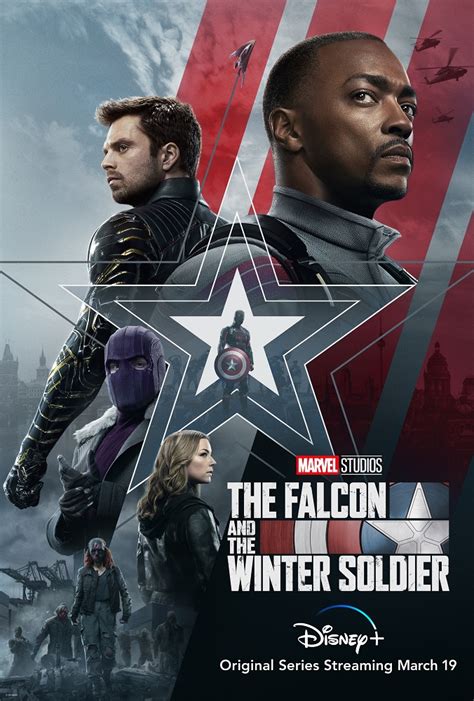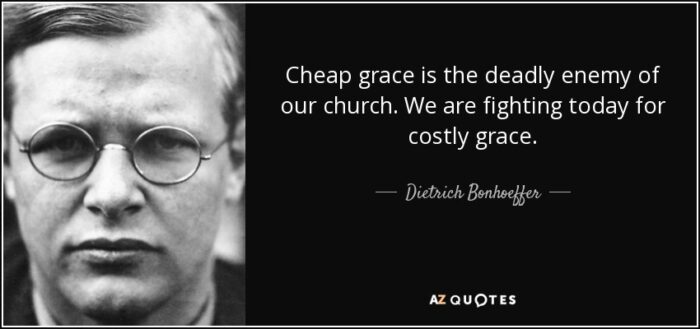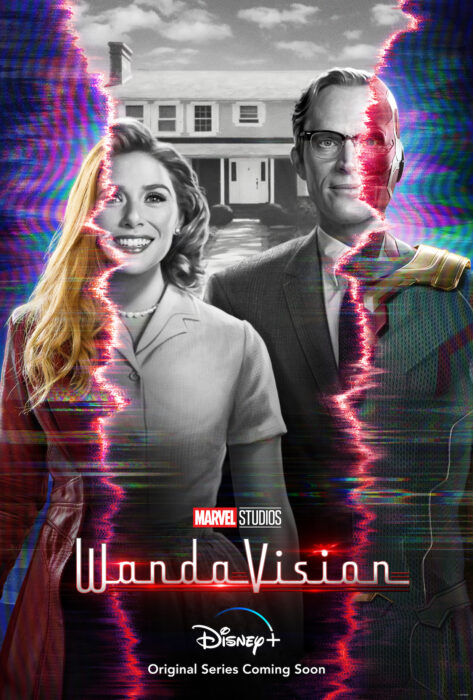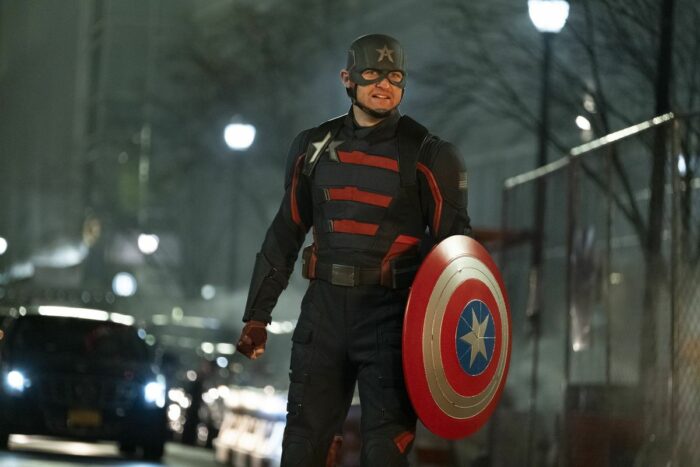Flagging the Cheap Grace of Marvel’s ‘The Falcon and the Winter Soldier’
Marvel’s Disney+ series The Falcon and the Winter Soldier began with star-spangled plans but, like its patriotic heroes, ended up with a complicated legacy.
This Captain America franchise sequel did offer many highlights. I enjoyed learning more fallout from the Blip (that is, Thanos’s “snap” decimation). For a TV series, it shared some fantastic action sequences. It boasted great character moments. And Baron Zemo was an absolute show-stealer.
Several glitches, however, kept Falcon from fully taking off. The story made admirable attempts to deal with real-world themes, but these often came off as clunky and simplistic. (Both conservative and liberal media critics I follow on Twitter recognized this.) As an organization, the Flag Smashers’ goal and ideology seemed terribly confusing. But worst of all, the character arc of John Walker, the new Captain America, ended up a bungled mess.
John Walker was actually one of my favorite characters. Actor Wyatt Russell absolutely nailed the performance of a “love-to-hate” villain. For the first five episodes, he was a highlight of the series for me. Then came episode six.
 Ruining the character of John Walker
Ruining the character of John Walker
Going into this episode, we know Walker has three Medals of Honor, but he seems to have been earned these under shady circumstances. From the beginning of his appointment as the new Captain America, he earnestly wants to live up to this role. But he doesn’t easily listen to correction or respond well to opposition. He has a fierce temper and can wield his power in rather authoritarian ways.
All these flaws culminate in the scene in which Walker (probably) beheads one Flag Smasher villain in public. Some of my conservative friends defend this decision because the Flag Smasher was a terrorist. But this villain was also a surrendered enemy combatant. At that point, he deserved true justice from a proper authority—not from a vigilante executioner’s shield.1
After this execution, in the season’s last episode, Walker actually decides to save a vehicle full of officials instead of pursuing the Flag Smashers’ leader. Sam Wilson and Bucky Barnes decide to work alongside him, without offering any negative comments. If you take the last episode by itself, Walker almost seems to be a hero.
One could argue that Walker’s true allegiances by the end are murky. But director Kari Skogland seems to disagree:
We left it a little vague on purpose but at the end of the day, I wanted people to like [John Walker]. And I think everybody does like him. Now, they went through a period of not liking him at the beginning because he started out feeling like “Wait a second, is that the guy?” But then, through the calibration of performance as such, we realize he’s coming from a very earnest place… And the big point is when he makes the decision to abandon vengeance. He’s got Karli and he’s got the GRC guys who are about to die. What does he do? He makes the right choice for the first time in a long time. And so that’s a bit redemptive.2
Even if we ignore the show’s issues by claiming everyone now likes Walker—a claim disproved by a brief internet search—this idea leaves massive implications for the show’s ending. Are we really supposed to root for such a bad hero just because he did one good thing?
Episode six, as interpreted by the director, reveals a vital misunderstanding about the nature of true grace and transformation.
What Bonhoeffer reveals about grace
 Most of the series’ action takes place in Latvia. But let’s travel south to a real-life European writer who spent eighty years ago considering what real grace looks like.
Most of the series’ action takes place in Latvia. But let’s travel south to a real-life European writer who spent eighty years ago considering what real grace looks like.
In his classic work The Cost of Discipleship, German theologian Dietrich Bonhoeffer described the difference between costly grace, as Christians understand, this from cheap grace:
The essence of [cheap] grace is that the account has been paid in advance; and, because it has been paid, everything can be had for nothing… No contrition is required, still less any desire to be delivered from sin… Cheap grace is the preaching of forgiveness without requiring baptism, baptism without church discipline, Communion without confession, absolution without personal confession. Cheap grace is grace without discipleship, grace without the cross, grace without Jesus Christ, living and incarnate.3
In other words, cheap grace is the notion that our sins can be forgiven without any meaningful confession, consequence, or change.
Bonhoeffer contrasts cheap grace with what he calls costly grace. He argues that true grace is costly because “it calls us to follow Jesus Christ” and “costs a man his life.” True, costly grace condemns sin and cost God the life of his Son. Of course, it’s also true grace because it “gives a man the only true life” and “justifies the sinner.”4
But a person who shows true grace doesn’t just throw up his hands and forget the past. We can forgive the past, but that forgiveness comes with confession, consequence, and change.
If we talk about consequence as necessary for forgiveness, this may seem at odds with grace’s depiction in certain evangelical circles. But the Scriptures never ignore consequences. The Bible simply teaches that Christ took sin’s eternal consequence upon himself. Even while Christ has taken sin’s eternal consequences, forgiveness doesn’t remove all temporal consequences. Adam and Eve were still expelled from Eden. David still felt the lifelong consequences of his abuse of Bathsheba. And while Paul after his conversion eventually enters Christian ministry, he does so only after many years of silent study.
It isn’t easy or instant to repair the human damage of sin. If stories show such easy transformations, they misrepresent the reality of human nature and of grace.
Rejecting John Walker’s cheap-grace ‘redemption’
Scrutiny shows us that John Walker’s “redemption” in The Falcon and the Winter Soldier’s final episode is nothing less than cheap grace.
Sure, Walker might have made one good decision—trying to save a van full of officials. But has Walker considered and confessed his arrogance, anger, or stubbornness? Has he owned the consequences from his lies and reckoned with the surrendered enemy whom he brutally murdered? Has he shown a pattern that reveals that he’s undergone a true heart transformation?
The answer is clear.
John Walker can’t repent in the space of a single episode. Maybe he can do this over a full season 2. I would love to see him slowly find brutal honesty, own his mistakes, humble himself, and seek to do good away from the spotlight of heroism. In fact, this is similar to Bucky’s character arc throughout this first season!
 But when narratives show repentance as instantaneous, cheap, and easy, they ignore real harm and consequences. In fact, The Falcon’s Marvel TV predecessor, WandaVision, falls into a similar cheap-grace trap. By its conclusion, Wanda Maximoff finds redemption by fixing a problem, yet without going through the hard work of facing and owning the consequences of her choices. Certainly her errors aren’t like Walker’s. They’re more sympathetic, given her emotional trauma. But the show’s end leaves us confused about precisely why she changed and what she’s owned about herself.
But when narratives show repentance as instantaneous, cheap, and easy, they ignore real harm and consequences. In fact, The Falcon’s Marvel TV predecessor, WandaVision, falls into a similar cheap-grace trap. By its conclusion, Wanda Maximoff finds redemption by fixing a problem, yet without going through the hard work of facing and owning the consequences of her choices. Certainly her errors aren’t like Walker’s. They’re more sympathetic, given her emotional trauma. But the show’s end leaves us confused about precisely why she changed and what she’s owned about herself.
What’s next? Will Loki come to terms with his own crimes in his upcoming self-titled television series? Or will he simply move to making better choices without dealing with his own past? (My fingers aren’t crossed.)
Cheap grace ruins potential heroes
Marvel television doesn’t exactly have a great track record about showing realistic consequences for its characters’ choices. Within a story, cheap grace may feel lazy or annoying, but it doesn’t go much beyond that. But when cheap grace moves from the fictional world to the real world, and real people make bad choices without consequences, we find devastating consequences.
Over the past few months we’ve seen this in the evangelical Christian world.
Acclaimed apologist Ravi Zacharias made a good show about his regret over the “ongoing communication with a woman other than my wife.” But he denied the truth about his choices and kept his position of influence. After his death, we learned more truths about his widespread and horrific abuse of women.
Meanwhile, Mark Driscoll, a well-known leader in the early 2000s “young, restless, and Reformed” movement, left Mars Hill Church when his elders accused him of a domineering, arrogant leadership. He started a new megachurch in Arizona. Then in May 2021, reports indicated he was still engaging in abusive behaviors.
Christians must take seriously Christ’s warnings against wolves that wear sheep’s clothing. Many deceivers know how to fake the stages of repentance and claim cheap-grace “forgiveness,” just so they can keep devouring the sheep. However, we can use biblical litmus tests of confession, consequences, and change to separate truly repentant sinners from the hypocrites whom Jesus called “whitewashed tombs” that look beautiful but cover dead men’s bones.5
In the fiction world, it’s better for stories to reflect this discernment and deal meaningfully with sin. How much more honest and fascinating would we find The Falcon’s final episode if Walker kept the Flag Smashers from surrendering because they’d seen what he did to Nico, thus forcing him to see what his actions cost? Or what if Walker saved the truck to earn Falcon and Bucky’s trust, only to use their trust to return to his same abusive approach to super-soldiering? Or, if the show’s creators wanted a redemptive arc, they could have written a more poignant ending that humbled Walker and forced him to confront his deeds.
If stories like The Falcon and the Winter Soldier suggest we should support abusive “heroes,” just because they made one good choice, these endorse a destructive narrative that only creates more victims and suffering in the real world.
- Commentators on YouTube or Twitter quickly reveal how much the show’s audience enjoyed ripping on Walker. Before this moment, he seemed sympathetic, but he’s also an unlikable jerk. Surprisingly enough, people don’t tend to find arrogant authoritarians terribly amiable. ↩
- “The Falcon and the Winter Solder’s Director Breaks Down Walker’s Arc, Steve’s Shadow, and More,” Germain Lussier, April 29, 2021, Gizmodo.com (emphases added). ↩
- Dietrich Bonhoeffer, The Cost of Discipleship, page 1. ↩
- Ibid, page 3. ↩
- Matthew 23:27. ↩






























Excellent lessons pulled from this series! I found “The Falcon and The Winter Soldier” overall enjoyable, but rather muddled and unwilling to truly dig into some of the deep issues it raised – ironic, given its insistence on facing other deep issues. Perhaps this was simply lazy storytelling.
However, I actually have to disagree with you: I don’t think that John Walker’s actions in saving the van were a redemption (even if evidently they were meant to be). It was a very good conclusion to his character arc in the series, in which he embraced a dark and violent extreme version of himself and then realized how harmful and destructive that could be, and decided to instead to pursue something more selfless, rather than revenge.
I found it a satisfying emotional conclusion… But not redemptive. I still don’t like John Walker, and I don’t trust him – which his last scene bore out, with him taking a new and decidedly shady job. He still hasn’t learned his lesson.
However. It would definitely have been better if the show had showed more of the consequences of his actions, as you suggested. And I REALLY wish the main characters had taken more action to see him reined in.
Also – I can’t believe anyone would justify Walker’s horrendous actions in murdering an enemy prisoner. That is terrible!
Walker never murdered an enemy prisoner. He killed a dangerous man at large.
I would agree that Walker actually was redeemed! I’m just concerned that the director’s intent behind that scene was to give him a redemption. But we will have to see where the series/characters go from here!
i agree with your main point that ‘cheap grace’ is a major issue in the film industry and Bonhoeffer is certainly closer to the definitions of redemption and grace. However, I would argue that John Walker did not do anything that would require redemption in the terms of his story arc. As a combatant who was ambushed with the intent to kill, and was only spared because his friend and fellow soldier took a blow for him, he had every right to hunt down and take everyone responsible into custody if possible. And if not possible, keep them from being a threat. All those superhumans were an accessory to murder, and were extremely dangerous. Taking them down by any means necessary was permissible, especially for a trained soldier given jurisdiction over them. It was only a shame because a symbol (who was going to be killed for being a symbol) was caught killing in a symbolic way that shocked the public.
If Nico hadn’t surrendered, I would agree with you. Given the fact that he was surrendering and begging for mercy, however, I view that as a pretty blatant violation of traditional military ethics.
There was so much “telling” in this series. Lots of on the nose dialogue and commentary that would have been a lot more powerful if they had done more “showing.” It had some great action sequences and a few interesting character moments but, overall, this was a weak entry. After the tour de force that was WandaVision, it felt like lazy storytelling.
This is excellent. Thank you!
Well said! Thank for making this point about stories and their use of cheap grace.